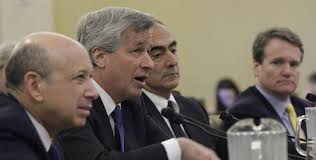[sgmb id=”2″]
So this is how the world’s largest global banks, in this case Barclays Plc, based in London, play the  regulatory and corporate accountability game:
regulatory and corporate accountability game:
The bank admits it deceived investors and swindled them out of $31 billion in mortgage backed securities that helped propel the 2008 housing market-led recession. In a suit to recover the money, originally initiated under the Obama Administration, the U.S. Department of Justice sought to impose a $5 billion in 2016, but the bank then said it would not pay any more than $2 billion, based on reporting on Bloomberg news. The DOJ has agreed to the settlement, so the bank comes out ahead.
As they always do.
Worse, this is not the first time Barclays has walked the line and ended up violating the law. Bloomberg reports that Barclays, “the struggling lender for more than a decade” has been involved in lawsuits, fines and settlements over the banks bid rigging of LIBOR interest rates, foreign currency markets and selling insurance to customers who did not need it.
The wealth destructive impacts of the 2008 real estate fraud-related recession are still affecting many individual investors, but Barclays is certainly not the only fraudulent banking corporation that spurred the recession.
As discussed on this site in a few posts, the 2008 recession wiped out billions in wealth for millions of Americans. Other large banks which have been hit for big fines for profiting from selling mispriced or hollow mortgage-related financial instruments are: Bank of America (fined $16.6 billion), JP Morgan (fined $13.7 billion), Citigroup (fined $7.7 billion), Morgan Stanley (fined 4.8 billion), Goldman Sachs (fined $.2 billion) and Wells Fargo (fined $1.4 billion).
It is worth noting that even with these large fines that depressed the respective bank’s stock prices, very few of the executives and traders ever spent a day in jail under both the Obama and Bush administrations. Nor, did many of the executives have to repay the bonuses they earned for selling the bogus mortgage-related securities. Crime does pay.
This may be the last of the large fines paid by a major bank that profited from the 2008 recession (the Bank of Scotland is still in the process of settling with the DOJ), but the power relationship of U.S. banks with with the Trump administration today is stronger than ever. U.S. global banks recently benefitted from the relaxation of Dodd-Frank financial regulations concerning their capital requirements, and some of the banks have benefited from entering the market in China.
What This Means to Individual Investors
Progressive investors can digest this news and realize they have some power.
First, if you have a banking relationship with any of these banks that paid huge fines, re-consider the relationship. There are plenty of local credit unions, which can handle most small business and individual banking needs. Co-ops are locally owned, non-profit and none had a role in the 2008 mortgage crisis.
The large banks have frequently shown they often victimize their own individual retail customers by selling them expensive products or products they never requested. Make the change. Consider the benefits of co-op banks.











